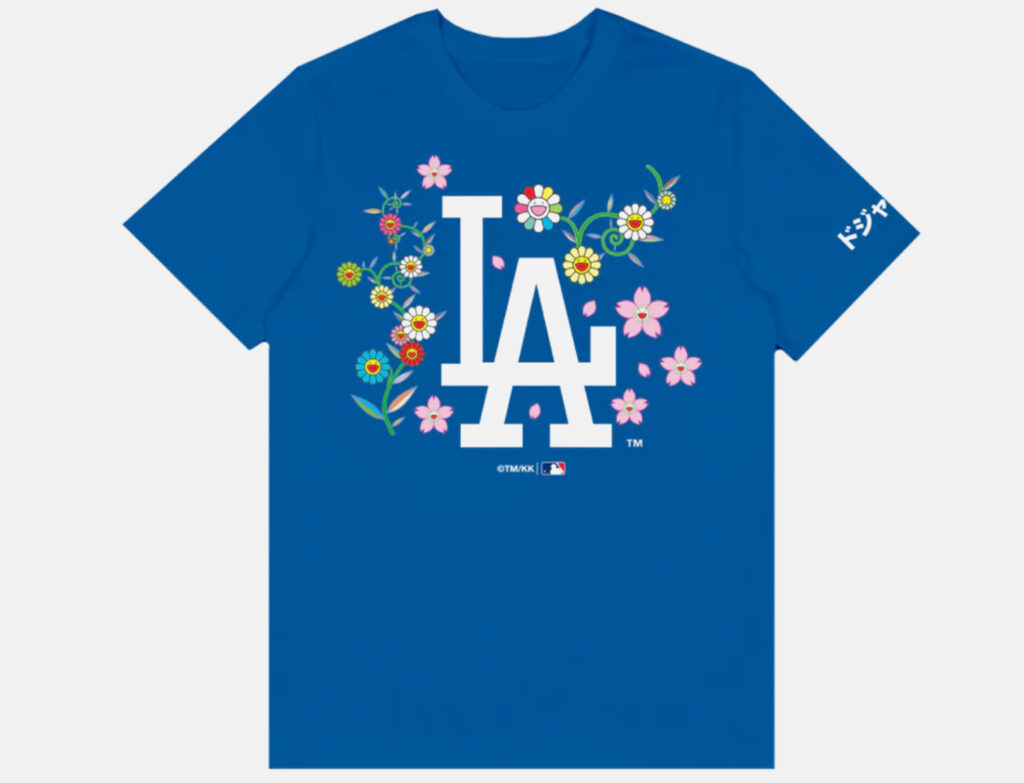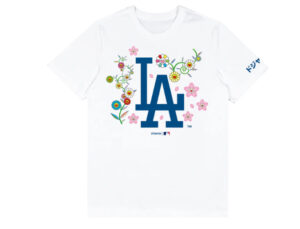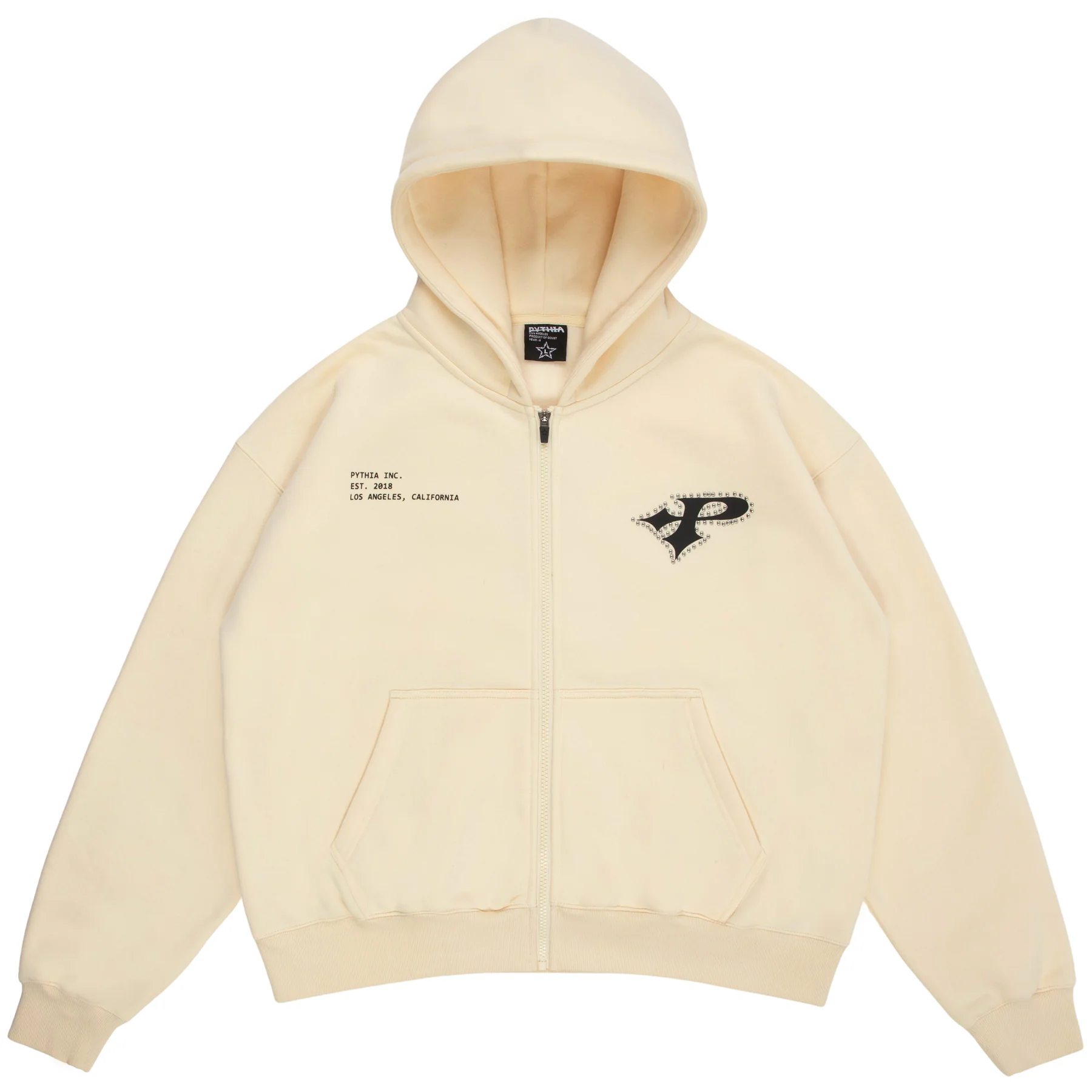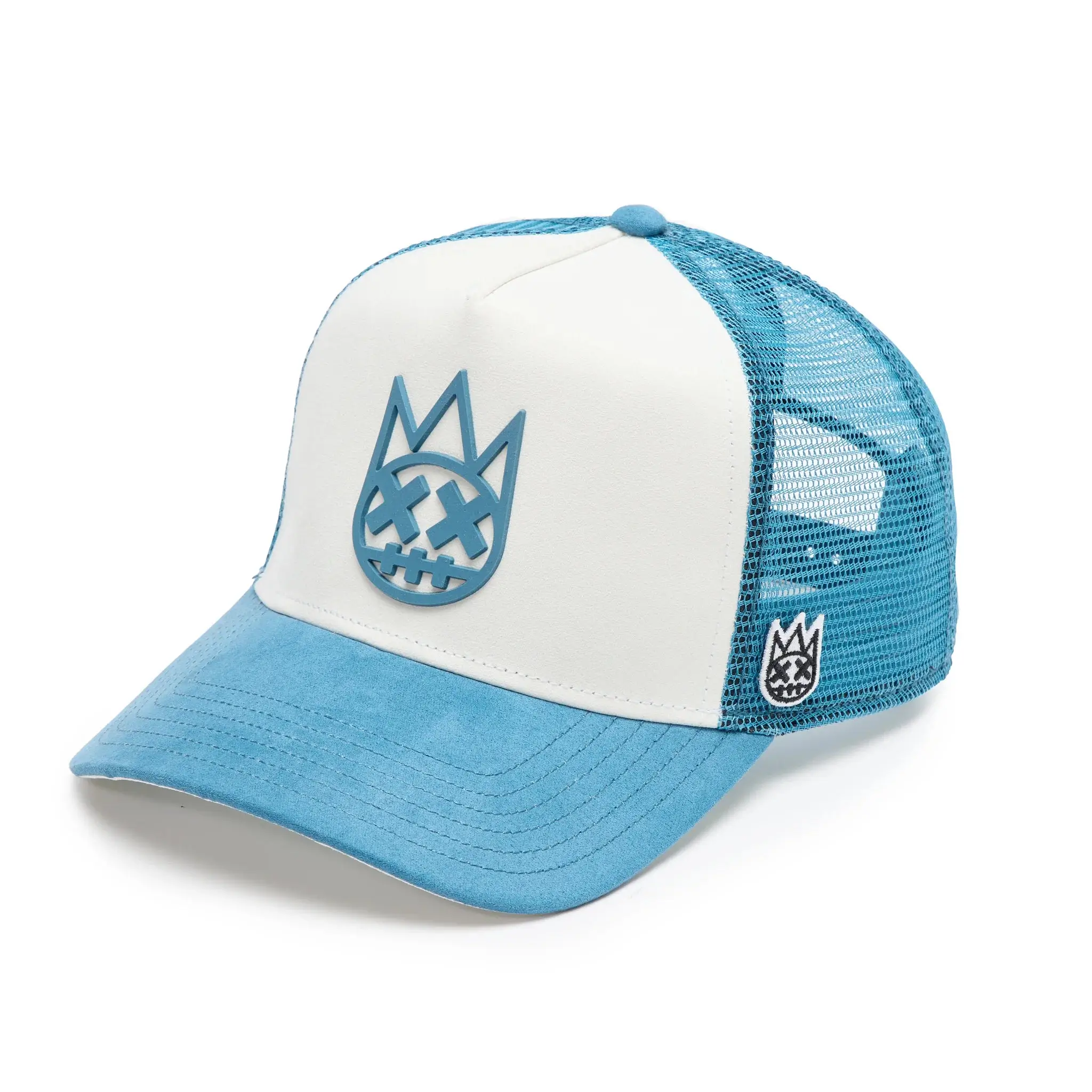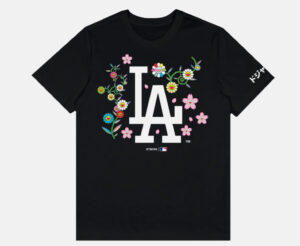
In the ever-collapsing space between fine art and popular culture, the black Takashi Murakami x Dodgers shirt exists not just as merch, but as artifact. A union of baseball iconography and postmodern Japanese art, it operates on multiple registers: as wearable streetwear, as collectible object, and as cultural commentary. This is not merely a souvenir for fans of the Los Angeles Dodgers or followers of Murakami’s Superflat empire. It is, in its most layered form, a meditation on the elasticity of American symbolism when refracted through a global lens.
Murakami—never one to shy away from the commercial—has long toyed with the conventions of pop culture, reimagining icons in psychedelic hues, flattening traditions into the vibrant 2D language of manga, and navigating the emotional corridors between kawaii and catastrophe. His collaboration with the Dodgers, particularly this black tee, distills his method into its most accessible form. At once playful and self-aware, it reflects both the spectacle of baseball and the surreal spectacle of being a fan in an image-saturated, post-ironic age.
An Emblem of Cross-Cultural Collisions
The black Murakami x Dodgers shirt makes a strong first impression. Printed boldly across its front is the classic LA Dodgers script logo, but altered, softened, and surrounded by Murakami’s signature technicolor smiling flowers—motifs familiar to art collectors and streetwear aficionados alike. Rendered with his typical precision and fluorescent palette, the flowers interrupt the stoicism of the sports logo, replacing grit with glee, nostalgia with naïveté.
The collision of cultures is deliberate. The Dodgers logo, a symbol of Americana since the franchise’s days in Brooklyn, becomes a canvas upon which Murakami applies his transnational, genre-blurring worldview. It’s a reminder that baseball—the so-called national pastime—is not solely American anymore, just as Murakami’s art, though deeply rooted in Japan’s aesthetic traditions, is no longer bound by national borders. This shirt, then, is globalism made garment.
Uniform as Canvas, T-Shirt as Gallery
While collaborations between artists and sports franchises aren’t new, few manage to balance authenticity and experimentation like this one. The shirt doesn’t attempt to rebrand either Murakami or the Dodgers; it allows both identities to remain intact while intersecting in unexpected ways. The black base is key: it elevates the shirt from summer-ready fan gear to something closer to a concert tee or a fashion week flex. Black signals permanence, seriousness, versatility.
By printing his iconic flowers on a garment otherwise associated with masculine team loyalty, Murakami subverts the idea of the uniform. Where traditional jerseys stress conformity, hierarchy, and order, this shirt suggests imagination, spontaneity, and play. It asks: What if we wore our fandom like we wear our dreams—bright, strange, open to interpretation?
The Language of Murakami: Superflat in the Stadium
Murakami’s broader practice, defined by his theory of Superflat, is rooted in the flattening of aesthetics, meaning, and high/low cultural boundaries. In this framework, a t-shirt is no less significant than a canvas; a sneaker collaboration no less worthy of critical analysis than a museum retrospective. The black Dodgers tee exemplifies this collapse of vertical hierarchies. It’s not “art-inspired merch.” It is the art.
In fact, Murakami’s flowers—symmetrical, smiling, endlessly repeatable—are designed for such democratized surfaces. They hold their form across silk screens and billboards, on bags and on ball caps. Unlike many contemporary artists, Murakami resists the false dichotomy between the limited edition and the mass-produced. This t-shirt, produced in quantity yet still resonant with Murakami’s visual language, exists as both product and commentary on consumption.
Wearable Allegiances: From Stadium to Sidewalk
The demographics for this shirt are as layered as the meanings it carries. A Dodgers fan might purchase it as a nod to team pride, with little knowledge of Murakami’s artistic pedigree. An art student might wear it as an ironic gesture, a way to collapse the distance between Gagosian and the ballpark. A sneakerhead might pair it with their Travis Scott x Jordan 1s, knowing full well it sits at the intersection of hype and heritage.
That’s the shirt’s strength: it functions in multiple ecosystems. It’s streetwear for the gallery crowd, sportswear for the art crowd, a collectible for both. In doing so, it becomes a case study in how garments can carry overlapping narratives—of place, identity, taste, and access. The shirt might be “just” a black tee, but within it lives the entire circuitry of modern cultural exchange.
The Market and the Moment
Of course, none of this exists in a vacuum. The shirt’s launch came at a moment when collaborations are both market strategy and artistic medium. Murakami has previously worked with Kanye West, Louis Vuitton, Supreme, Uniqlo, and ComplexCon. The Dodgers, meanwhile, have flirted with high fashion before—remember their collaboration with Fear of God’s Jerry Lorenzo. What makes this release feel different is how seamlessly the identities merge, without overwriting one another.
Moreover, the shirt holds up under market scrutiny. It’s wearable, collectible, and tied to two powerful fan bases. Murakami’s art pieces often sell for millions, but this shirt, priced accessibly, offers entry into that same universe for a fraction of the cost. And yet, its value isn’t just economic—it’s symbolic. To wear it is to participate in a moment, to embody a convergence.
A Soft Power Statement
Perhaps more subtly, the black Murakami x Dodgers tee operates as a form of soft power: a Japanese artist reconfiguring an American pastime, offering not critique but reimagination. Baseball is huge in Japan. So is Murakami. By fusing the two, this shirt becomes a symbol of cultural reciprocity. It doesn’t erase difference but celebrates hybridity. It says something quietly radical: that fandom doesn’t have to be exclusionary, that art can live in the stands, and that maybe, just maybe, the jersey can smile back.
Flow
In a world increasingly allergic to sincerity, the black Takashi Murakami Dodgers shirt achieves something rare: it delights without dumbing down, and it invites without pandering. It’s clever but not cynical, joyful but not naive. Through it, Murakami reaffirms his commitment to bringing art into the everyday, to collapsing the museum wall and replacing it with cotton jersey.
Whether you wear it to a game or a gallery opening, whether you know who pitched for the Dodgers in ’88 or just love smiling flowers, the shirt asks only one thing: to be seen. And in doing so, it becomes more than a union. It becomes connection.
No comments yet.

